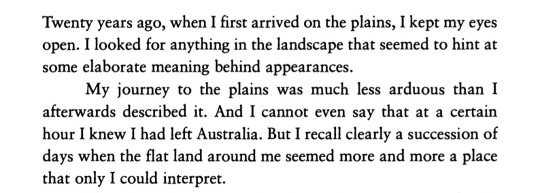#gerald murnane
Text
“The place we commonly call the real world is surrounded by vast and possibly infinite landscape which is invisible... but which I am able to apprehend by other means. The more I tell you about this landscape, the more inclined you might be to call it my mind.”
— Gerald Murnane
5 notes
·
View notes
Text
the best kind of thinking is only a subtle kind of feeling
Gerald Murnane in a review: 'Of those three distinctively human activities, laughing, crying and thinking, the third is most often ranked highest, and books that provoke thought likewise. I do not agree with these rankings. I even wonder, as Robert Musil wondered, whether the best kind of thinking is only a subtle kind of feeling. These remarks make me think that one writes only as one can, as one's character allows and equips one to…that theories and beliefs are superimposed, almost irrelevant.
— Helen Garner, One Day I'll Remember This: Diaries 1987–1995 (Text Publishing Company, October 12, 2021)
9 notes
·
View notes
Note
Just rereading Gerald Murnane's 'In Praise of the Long Sentence' and it got me wondering what your favorite sentences were — of other people's work, and of your own
I generally take note of passages more than single sentences, even long ones, but I will single out the almost page-long penultimate sentence of DeLillo's Underworld as perhaps my favorite long sentence (you can read it without "spoiling" the novel, which has no plot, but it does pick up phrases and motifs from earlier in the book that give it some of its power):
And you can glance out the window for a moment, distracted by the sound of small kids playing a made-up game in a neighbor’s yard, some kind of kickball maybe, and they speak in your voice, or piggyback races on the weedy lawn, and it’s your voice you hear, essentially, under the glimmerglass sky, and you look at the things in the room, offscreen, unwebbed, the tissued grain of the deskwood alive in light, the thick lived tenor of things, the argument of things to be seen and eaten, the apple core going sepia in the lunch tray, and the dense measures of experience in a random glance, the monk’s candle reflected in the slope of the phone, hours marked in Roman numerals, and the glaze of the wax, and the curl of the braided wick, and the chipped rim of the mug that holds your yellow pencils, skewed all crazy, and the plied lives of the simplest surface, the slabbed butter melting on the crumbled bun, and the yellow of the yellow of the pencils, and you try to imagine the word on the screen becoming a thing in the world, taking all its meanings, its sense of serenities and contentments out into the streets somehow, its whisper of reconciliation, a word extending itself ever outward, the tone of agreement or treaty, the tone of repose, the sense of mollifying silence, the tone of hall and farewell, a word that carries the sunlit ardor of an object deep in drenching noon, the argument of binding touch, but it’s only a sequence of pulses on a dullish screen and all it can do is make you pensive—a word that spreads a longing through the raw sprawl of the city and out across the dreaming bourns and orchards to the solitary hills.
And then this, from early in Mrs. Dalloway, a sentence that opens the day-in-the-life novel out into immensities of time past and time future, is pretty unforgettable:
But there could be no doubt that greatness was seated within; greatness was passing, hidden, down Bond Street, removed only by a hand's-breadth from ordinary people who might now, for the first and last time, be within speaking distance of the majesty of England, of the enduring symbol of the state which will be known to curious antiquaries, sifting the ruins of time, when London is a grass-grown path and all those hurrying along the pavement this Wednesday morning are but bones with a few wedding rings mixed up in their dust and the gold stoppings of innumerable decayed teeth.
Among older classics, I love the first sentence of Emma, for which see Paglia's reading thereof—about how the sentence begins in the 18th century and ends in the 19th—in Sexual Personae:
Emma Woodhouse, handsome, clever, and rich, with a comfortable home and happy disposition, seemed to unite some of the best blessings of existence; and had lived nearly twenty-one years in the world with very little to distress or vex her.
Favorite sentences in nonfiction? I love the rolling rhetorical thunder of the one from Ruskin's "Nature of Gothic" I recently read out in one of my Invisible College lectures:
And therefore while in all things that we see, or do, we are to desire perfection, and strive for it, we are nevertheless not to set the meaner thing, in its narrow accomplishment, above the nobler thing, in its mighty progress; not to esteem smooth minuteness above shattered majesty; not to prefer mean victory to honorable defeat; not to lower the level of our aim, that we may the more surely enjoy the complacency of success
I'm sure I'm forgetting things. Melville, Joyce, Faulkner, Bellow, Morrison. Shakespeare, the Bible. The last sentence of Suttree. That's what I have for now, though.
In my own work? My favorite sentence in Major Arcana, to cite only my latest production, is probably this, the conclusion of an early chapter:
The social worker kept saying Jakey had “died by suicide,” and, because she was insane by this point and couldn’t really breathe, she’d said, just to see if she could say something, “Isn’t it ‘committed’? ‘Committed suicide’?” and then the social worker with the mousy hair and the glasses had said, “Well, that implies it’s a sin,” and she’d answered with the question, “Isn’t it? Against life, I mean?” and the social worker who may once have been a sex worker had said, with pity in her eyes, “I’m sorry—are you very religious?” and Jessica Morrow had said, finally, “No. I don’t believe anything at all.”
If that's too sentimental, or too particular to its context, and not euphonious enough, try the sound effects in this one:
Her head spun, rung, drummed; her stomach churned, burned, surged.
Or this, from an early description of the city called Cosmopolis:
The older buildings, the banks and department stores from the first part of the century, held runic messages on their friezes; strange demons nestled, staring, from their eaves and buttresses; masonic mysteries hid in the upper air.
2 notes
·
View notes
Text
Gerald Murnane's Inland (Beautiful book acquired some time last week, like maybe 11 Oct. 2023)
I love the new And Other Stories covers that just start, and I’m psyched on their edition of Gerald Murnane’s 1988 novel Inland. Their blurb:
Inland is a work which gathers in emotional power as it moves across the grasslands of its narrator’s imagination – from Szolnok County on the great plains of Hungary where a man writes in the library of his manor house, to the Institute of Prairie Studies…

View On WordPress
2 notes
·
View notes
Quote
...our joys and pleasures are only a compromise between our wants and our circumstances.
Gerald Murnane, The Plains
20 notes
·
View notes
Text
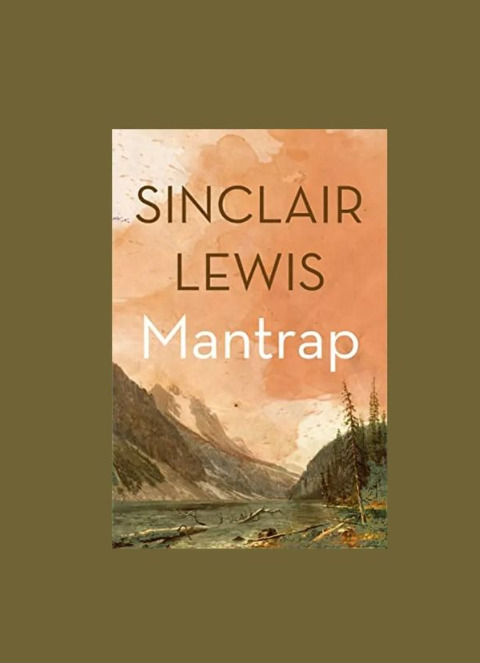
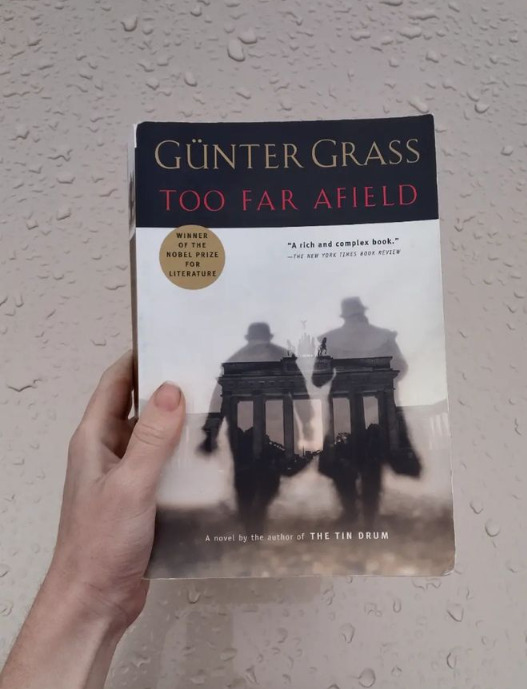


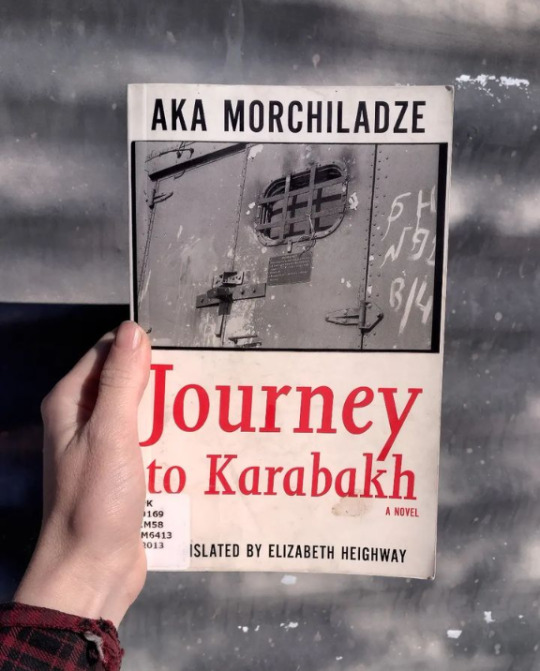

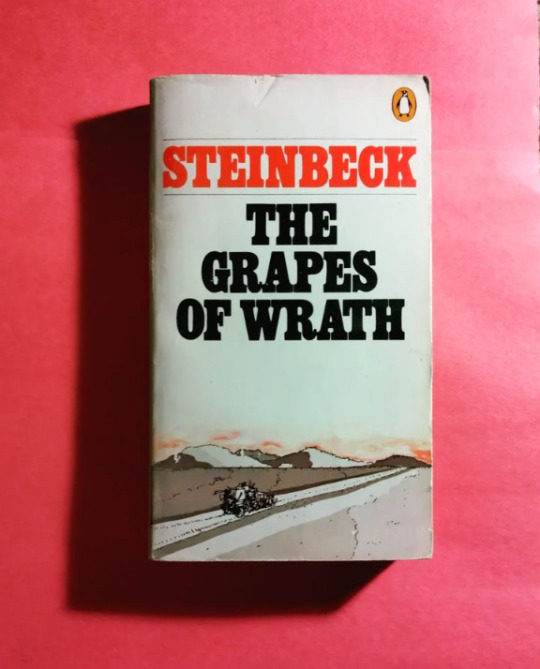

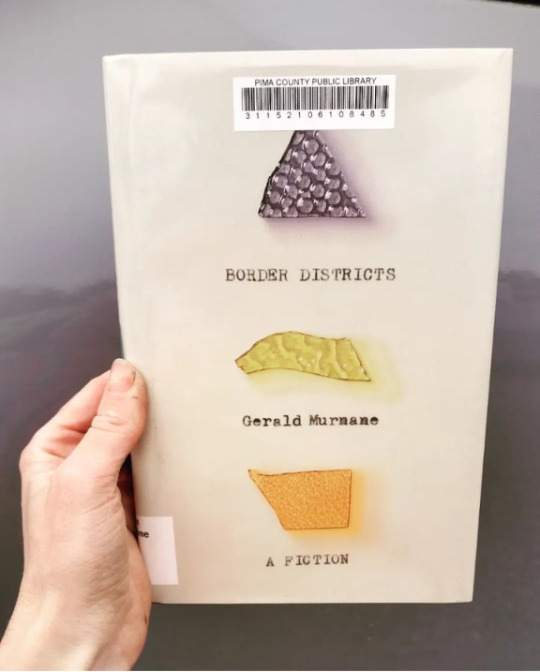

First ten books of the year 📚!
#read in 2023#kurt vonnegut#günter grass#john steinbeck#edgar hilsenrath#juan rulfo#gerald murnane#bernard tschumi#yoko tawada#aka morchiladze#gunter grass#sinclair lewis#talks
6 notes
·
View notes
Quote
I was reassured yet again of the truth of the claim that no such thing as ‘Time’ exists; that we experience only place after place; that remembering, as we call it, is no sort of rediscovery or recollection but an act performed for the very first time somewhere in the endless place known as the present.
Gerald Murnane, Last letter to a reader (fonte: https://www.newyorker.com/magazine/2022/08/01/the-reclusive-giant-of-australian-fiction)
3 notes
·
View notes
Text
With playwright Jeremy O. Harris tapped as “librarian” emcee, the evening was filled with readings — Joseph Gordon-Levitt chose the foreword of Neil Postman’s “Amusing Ourselves to Death,” while Shanola Hampton took on “Oh, the Places You’ll Go!” by Dr. Seuss. Patton Oswalt made the room laugh with a passage from “Tamarisk Row” by Gerald Murnane, as did Jon Hamm, reciting “Good Omens” — Gaiman and Terry Pratchett’s 1990 novel — which Gaiman adapted into a fantasy-comedy television series. Hamm is among its cast.
“Hot mic, hot mic,” Hamm said. “You’ll have to excuse me…I can only hear the voices of the co-leads,” he went on, referencing his costars, Scottish actor David Tennant and Welsh actor Michael Sheen. “I’m going to do a ridiculous approximation of their accents. Bear with me.”
Anyone knows if there is a recording of this? 👀❤
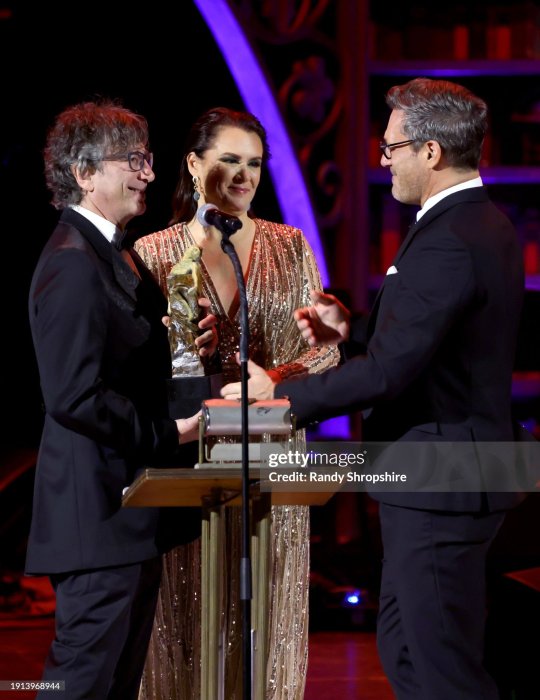
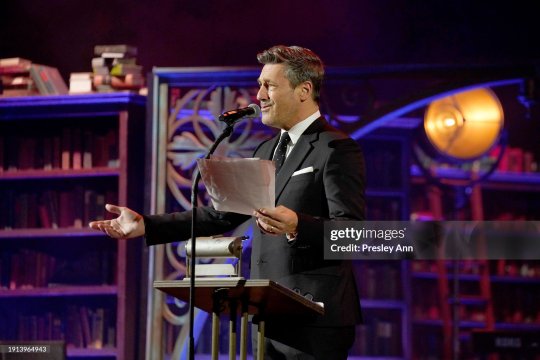
246 notes
·
View notes
Text
“Everything is brought into the present to reveal the paradox of existing in time: nothing in this life is ever truly past, and everything in this life is always already over.”
Merve Emre on the novelist Gerald Murnane
30 notes
·
View notes
Note
Contemporary (+ living) author recommendations: Alexis Wright, Gerald Murnane, Maria Stepanova, Adania Shibli.
Thank you for these!😄
6 notes
·
View notes
Text
"What I looked for in films was what I called pure scenery. I thought of pure scenery as the places safely behind the action: the places where nothing seemed to happen. Occasionally I glimpsed the kind of scenery I wanted. Behind the men on horses or the encampment of wagons was a broad tract of tall grass leading back to a line of hills. When I saw any such banal arrangement of grassy middle distance and hilly background, I tried to do to it something for which the simplest word I could have found was swallow. I wanted to feel that waving grass and that line of hills somewhere inside me. I wanted grass and hills fixed inside the space that began, as I thought, behind my eyes."
— Gerald Murnane, Invisible Yet Enduring Lilacs
2 notes
·
View notes
Text
But his oeuvre is animated by the search for an elusive transcendence.
Murnane, 83, is one of the great prose writers in English. His long, lyrical sentences tease out the features of a scrupulous personal mythology. The relation between the visible world and the one that hides within it furnishes his plotless novels with their oblique drama. (Murnane has been known to quote Paul Éluard’s famous dictum: “There is another world, but it is in this one.”) His literary obsessions — grasslands, horses, an entirely imaginary American Midwest, libraries, animals, colored glass — aspire to the condition of ritual. This is not to imply he is a religious writer. (Murnane entered the seminary at 18 and left three months later.) But his oeuvre is animated by the search for an elusive transcendence. When looking over the endless paddocks of his fictions, one is also looking out at the mysterious landscape of the soul.
— Dustin Illingworth, After a Five-Decade Run, a Master Hangs Up His Reins (NY Times, May 3, 2022)
6 notes
·
View notes
Note
Can you recommend books written by contemporary authors that you consider good literature?
Sure! As contemporary is such a wide-term, I'll try to stick to books published within the past two decades (with inevitably a few books from the 80s and 90s making their way in) or whose author are still writing/still alive.
Zabor or the Psalms by Kamel Daoud (2017). It's a flawed book, as many on this list are. It's originaly in French, being its first flaw. And it slightly loses orientation towards the end, in my opinion. But it's still very much worth the read. The story concerns "Zabor", who believes (or is!) that he holds peoples' lives in his hand, or more accurately in his writings. So the entire book is very much concered with the art of writing, with literature, its power, limitations, etc. Being set in Morocco, it's also concerned with colonialism, religion, faith and God and all that ordeal, and it's tied pretty well with its main themes. Things become more complex when Zabor's father, who abandoned him as a boy, gets fataly sick and his other family members recluse to Zabor as a last chance to prolong his life. It can be a tedious read in a way, the prose is obsessive, repetitive, elaborative, urgent, and frantic. Which as ostensious as it can get, fits REALLY well with the book (and are all words that describe the main character). Perfect form and content complementing each other to serve the same end. I haven't yet read anything else of Daoud, so I'm not sure whether it's his personal style or designed like this for this one particular novel, but what matters is that it works really well. The novel is overall really enjoyable.
Tyll by Daniel Kehlmann (2017). A pretty ambitious novel that covers the Thirty Years' War through the use of the Jester Tyll Ulenspiegel. That sounds slightly wrong. Tyll isn't a mere propp here to allow the largely non-linear narrative to jump from one place to the other. He's an incredible depiction of a resilient, mocking, cruel, ambitious trickster. The novel crosses roads with superstition, folklore, magical realism, the pursuit of science, art, and power, all while covering a pretty turbulent period that's difficult to grasp. It's somewhat funny, dark, and also emotional without ever getting sentimental.
The Plains by Gerald Murnane (1982). This is a book difficult to speak or write about. It's just an experience I highly recommend you go through. It's a book concerened with obscurity, and more originally than anything I've ever read, disfamiliaries anything possible; I can't promise you that you would have any idea what the narrator is talking about at any given point, but that doesn't matter. The premise is deceptively simple: a filmmaker takes a journey into a fictive inner Australia to research his original screenscript titled The Interior and to receive patronage for his film that is sure to depict "The Plains" in a way nothing has ever had before. There's very little plot, dialogue, or even named characters (not even the narrator is named) but that doesn't make it at all a boring or tedious read. And it creatively concerns itself with a myriad of themes regarding culture, borders, the obsession with distinctinvness, the endless search for meaning, uttering the unutterable, all within a mirage. The prose is beautifully, neatly, elegantly and complexly clear, without ever forsaking the Obscure it's dealing with. (In the back of my head there's a connection with Conrad's Heart of Darkness that's yet too elusive to capture.)
The Last Wolf & Herman by László Krasznahoraki. ( 2009): I'd recommend a lot by Krasznahoraki but this is a good place to start. There are two short novellas in the 2016 translated edition, this one and Herman, thematically somewhat connected but are pretty much stand-alones. The Last Wolf is a 70 pages one sentence of an ex-philosophy professor telling a bored Hungarian bartender in some deadbeat German bar the story of how he got a really generous invitation to Extremadura from a foundation that wants him to write about the region in its new transformative age, which leads him to a rabbit hole with the last wolf of the region that's proclaimed to have been killed in 1983 but which has a much more complex story the narrator gets increasingly obsessed and affected by. The thing about it is this inexplicable melancholy that takes over the narrator is very easily transmitted to the reader as well. The style is just Krasznahoraki really, you either like it or you don't, but it's definitely not this indecipherable, difficult or tedious style I've sometimes seen it proclaimed as, it's actually really gripping and does a really good job of crystalizing the inarticulable without persistenting on articulating it and thus mutilating it. Also again, is emotionally honest without ever nearing sentimentality.
The Dove's Necklace by Raja Alem (2010). This is a pretty peculiar novel that might not always be easy to stay on the same line with yet definitely worth it. It starts with a woman found dead and naked in a Meccan gritty alley, and you're being told the story by the alley itself. Then it just gets more and more complicated in every possible way, with dozens or so characters, different povs, etc. It's really grand in scope and lives up to that ambition in every way and in my opinion does every theme it takes (which are are a lot of them) justice. The prose is some of the best I've read in recent years. I would recommend though, if you are fluent in another language than English to look up that translation. The English translation is fine if it goes down to it, but it hardly does the original (especially the tone) justice; it takes a lot of liberty in "casualness" where the original is very refined, careful, and sparse.
The Neapolitan Novels by Elena Ferrante (2011- 2014). This one is self-evident lol, but if you haven't read it, I highly recommend you do. The Neopolitan Novel's place in literature and specifically Italian literature, I'm still unsure of. Elena Ferrante is maybe a a better narrator/storyteller than she is a writer (which is not to say she isn't a good writer, she's an incredible one) and it's evident in how gripping this entire story is. And with the wide-range of history and themes it covers, with dozens or so fully formed characters (not even mention the spectacular creation of the two main ones), you're abound to come across something that will particularly pique your interest.
The Door by Magda Szabó. Actually, Szabo's narrator in this novel reminds me a lot of The Neopolitan Novel's Elena. As different as it (really, not many mode points of comparison beyond the similarities between Elena and the Lady Writer), it also concerns an indecipherable relationship between two women; a young, important writer and her eccentric housekeeper. As much mutual love as grows between them, this is no wholesome novel and the book is all the better for it. The narrator is not at all likable; she's naive, selfish, irritating, self-righteous, self-victimizing, and as often aware of it all as not. The housekeeper is no angel either. Essentially, really, what is most interesting about this novel is how it deals with doing the unforgivable and the impossiblity of its resolve, yet with the inevitability of just having to live with it. Though the prose isn't really my cup of tea, and I'm sure I wouldn't actually read much by the narrator-writer [Ironic as I think the character is at least somewhat autobiographical], it's really well-written, and as far as I can tell, really good translation.
The Notebook Trilogy [The Notebook/The Proof/The Third Lie] by Ágota Kristóf. (1986-1991). I think, if you're going to read only one book on this list, this should be the one. Narrated by a nameless pair of twins (in the first one), the book starts with them being moved to their grandmother house in the (Hungarian-not a single country in the book is named, no revolution or war either. But it's clear) countryside somewhen during the last years of WWII, and carries along onto the first period of communist Hungary. The first novel uses the first person plural, the twin boys are inseparable and indistinguishable. They think, behave, and act as one. Though they are anything but naive, the style of writing is as concise as a fable's. Those kids, for all means and purposes, are what I would imagine biblical angels (TM) would be like as human children; terrifyingly ethical with complete detachment, and willngess, alongside the intelligence and capabilities, to do just about anything. And it only gets more interesting and much more complex from here. You can stop at the first and it'll be a perfect novel on its own accord. If you do continue though, be prepared to the have the story altered, affirmed, rejected and interogated in every possible way. Or you can continue, and take a page out of the book by dissecting yourself into two versions, one who did continue and one who didn't. I do believe reading this is an experience worth having in whatever case . Do read a little about the content before you read it if you do, though; the book is set during the war and doesn't shy away from anything, alongside a pretty fair amount of sexual perversion.
#that's all that comes to mind for now#I hope you end up enjoying any of them!#I've not actually read that much recently published novels and a lot of the ones I've read are too mediocre to recommend lol#read A Little Life as a teen and decided contemporary literature isn't worth it actually#my origin story atakwkwk#Book recs
7 notes
·
View notes
Quote
I too have admired the torturous arguments and detailed elaborations, the pointing-up of tenuous links and faint reverberations, and the final triumphant demonstrations that something of a motif has persisted through an immense body of digressive and even imprecise prose. And like the thousands of readers of those works, I have wondered at the speculations that lie at the heart of the subject they expound – the conclusions vehemently defended by men who admit them to be indefensible.
Gerald Murnane, The Plains
8 notes
·
View notes
